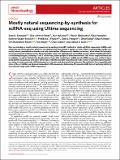Mostly natural sequencing-by-synthesis for scRNA-seq using Ultima sequencing
Author(s)
Simmons, Sean K; Lithwick-Yanai, Gila; Adiconis, Xian; Oberstrass, Florian; Iremadze, Nika; Geiger-Schuller, Kathryn; Thakore, Pratiksha I; Frangieh, Chris J; Barad, Omer; Almogy, Gilad; Rozenblatt-Rosen, Orit; Regev, Aviv; Lipson, Doron; Levin, Joshua Z; ... Show more Show less
DownloadPublished version (13.09Mb)
Publisher with Creative Commons License
Publisher with Creative Commons License
Creative Commons Attribution
Terms of use
Metadata
Show full item recordAbstract
<jats:title>Abstract</jats:title><jats:p>Here we introduce a mostly natural sequencing-by-synthesis (mnSBS) method for single-cell RNA sequencing (scRNA-seq), adapted to the Ultima genomics platform, and systematically benchmark it against current scRNA-seq technology. mnSBS uses mostly natural, unmodified nucleotides and only a low fraction of fluorescently labeled nucleotides, which allows for high polymerase processivity and lower costs. We demonstrate successful application in four scRNA-seq case studies of different technical and biological types, including 5′ and 3′ scRNA-seq, human peripheral blood mononuclear cells from a single individual and in multiplex, as well as Perturb-Seq. Benchmarking shows that results from mnSBS-based scRNA-seq are very similar to those using Illumina sequencing, with minor differences in results related to the position of reads relative to annotated gene boundaries, owing to single-end reads of Ultima being closer to gene ends than reads from Illumina. The method is thus compatible with state-of-the-art scRNA-seq libraries independent of the sequencing technology. We expect mnSBS to be of particular utility for cost-effective large-scale scRNA-seq projects.</jats:p>
Date issued
2022Department
Massachusetts Institute of Technology. Department of BiologyJournal
Nature Biotechnology
Publisher
Springer Science and Business Media LLC
Citation
Simmons, Sean K, Lithwick-Yanai, Gila, Adiconis, Xian, Oberstrass, Florian, Iremadze, Nika et al. 2022. "Mostly natural sequencing-by-synthesis for scRNA-seq using Ultima sequencing." Nature Biotechnology.
Version: Final published version